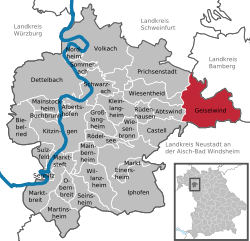Geiselwind
| Geiselwind | ||
|---|---|---|
| ||
 Geiselwind | ||
Location of Geiselwind within Kitzingen district  | ||
| Coordinates: 49°46′N 10°28′E / 49.767°N 10.467°ECoordinates: 49°46′N 10°28′E / 49.767°N 10.467°E | ||
| Country | Germany | |
| State | Bavaria | |
| Admin. region | Unterfranken | |
| District | Kitzingen | |
| Government | ||
| • Mayor | Ernst Nickel (FW) | |
| Area | ||
| • Total | 48.77 km2 (18.83 sq mi) | |
| Elevation | 345-442 m (−1,105 ft) | |
| Population (2012-12-31)[1] | ||
| • Total | 2,352 | |
| • Density | 48/km2 (120/sq mi) | |
| Time zone | CET/CEST (UTC+1/+2) | |
| Postal codes | 96160 | |
| Dialling codes | 09556 /09555 | |
| Vehicle registration | KT | |
| Website | www.geiselwind.de | |
Geiselwind is a market town with 2323 inhabitants in Lower Franconia (Bavaria) in the district of Kitzingen in Germany.
Autotranslaters may render its name into English as "hostage wind". However, in this case, "Geisel" means a special form of a whip, not a hostage.
Geography
Geiselwind is today in the governmental district of Lower Franconia (Würzburg). Up to the administrative reform Geiselwind still belonged to the governmental district of Middle Franconia. On the edge of the town area is the Dreifrankenstein ("Three Franconia Stone"), where the Bavarian provinces of Lower Franconia and Middle Franconia and Upper Franconia all meet.
To Geiselwind these areas belong: Burggrub, Dürrnbuch, Ebersbrunn, Füttersee, Geiselwind, Gräfenneuses, Holzberndorf, Ilmenau, Langenberg, Rehweiler, Wasserberndorf, Freihaslach.
History
The name Geiselwind can be dated to the 8th century AD. At this time by decree of the German emperor, Wends were settled in the Frankish area.
Geiselwind market in today's Lower Franconia belonged to the sovereign Grafschaft of Schwarzenberg. With the Rheinbundakte in 1806 the place was included in Bavaria. In the course of the administrative reforms in Bavaria, today's municipality developed with the municipality edict of 1818.
Inhabitant development
In the area of the municipality, in 1970 2,125, in 1987 2,016 and in 2000 2,323, inhabitants were counted.
Politics
The mayor is Ernst Nickel (free voter/land community). In 2002 he succeeded Gottfried Schaller (free voter/land community).
The local rate incomes amounted in the year 1999 to 997000 euro, of which the trade tax incomes (net) amounted to 303000 euros.
Economics and infrastructure
Economics as well as land and forestry
In 1998 there were these people who were "liable to social security" (sozialversicherungspflichtig: meaning please?):-
- On the land and forestry and in the producing trade: 0
- In the region, in trade and traffic: 203
- In other economic sectors: 243
- Working at home: 802.
In the processing trade there were 6 enterprises, in the building main trade 8 enterprises.
In 1999 there were 109 agricultural enterprises with a farmed area of 21.07 square kilometres, of which 12.92 km² were arable and 8.09 km² of continuously grass. The largest employers are:
- Leisure park Geiselwind
- Lorry and truck terminal Strohofer
- Reinlein Parkett
Education
In the year 1999 the following schools existed:
- Kindergartens: 100 kindergarten places with 102 children
- Elementary schools: 1 with 16 teachers and 278 pupils
- Six-form high schools: None
- High Schools: None
References
- ↑ "Fortschreibung des Bevölkerungsstandes". Bayerisches Landesamt für Statistik und Datenverarbeitung (in German). 31 December 2012.
